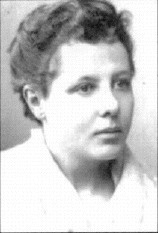October 1: Annie Besant
Annie Besant (1847)
It was on this date, October 1, 1847, that English Atheist-turned-Theosophist Annie Besant (originally Annie Wood), was born in London. Her widowed mother could find only enough work to support herself, so Annie was reared by a friend. At age 19, she was married off to the Rev. Frank Besant, whose narrow views made her question her religious beliefs. She tried to help his Lincolnshire parishioners, but recognized that society-wide poverty and other social ills required more than the ministrations of small parishes. The Rev. Besant, feeling threatened by her independent spirit, ordered her to leave, which Annie did with her two children.
Besant had completely rejected Christianity by 1874, saying,
Never yet has a God been defined in terms which were not palpably self-contradictory and absurd; never yet has a God been described so that a concept of Him was made possible to human thought.[1] The position of the atheist is a clear and reasonable one. I know nothing about God and therefore I do not believe in Him or it. What you tell me about your God is self-contradictory and is therefore incredible. I do not deny "God," which is an unknown tongue to me. I do deny your God, who is an impossibility. I am without God.[2]
At a radical periodical called the National Reformer, Besant found a kindred spirit in Charles Bradlaugh. During the next few years she wrote many articles on marriage and women's rights, including the pamphlet Marriage As It Was, As It Is And As It Should Be (1879), denouncing the unequal laws governing British women. Responding to Paul's advice that if men could not control their desires, "let them marry; for it is better to marry than to burn" (I Corinthians, 7:8,9), Besant wrote,
This coarse and insulting way of regarding woman, as though they existed merely to be the safety-valves of men's passions, and that the best men were above the temptation of loving them, has been the source of unnumbered evils.[3] ... For centuries the leaders of Christian thought spoke of women as a necessary evil, and the greatest saints of the Church are those who despise women the most.[4]
She was equally firm in her unbelief. In Why I Do Not Believe in God, Besant wrote,
If my interlocutor desires to convince me that Jupiter has inhabitants, and that his description of them is accurate, it is for him to bring forward evidence in support of his contention. The burden of proof evidently lies on him; it is not for me to prove that no such beings exist before my non-belief is justified, but for him to prove that they do exist before my belief can be fairly claimed. Similarly, it is for the affirmer of God's existence to bring evidence in support of his affirmation; the burden of proof lies on him.[5]
In 1877 Besant and Bradlaugh republished Charles Knowlton's book advocating birth control, for which they were both found guilty and sentenced to six months in prison. But the sentence was quashed at the Court of Appeal. (Rev. Besant used the controversy to win custody of the children, as Atheists were considered morally unfit to rear children.) Having opened the debate, Besant seized the opportunity to publish her own book advocating birth control, The Laws of Population.
During the 1880s, Besant spoke and wrote against unhealthy industrial conditions and low wages for young factory women. In 1888 Besant led the successful Match Girls' Strike: after three weeks, the company was forced to make significant concessions. In 1889 Besant was elected to the London School Board, where she promoted educational reforms.
But in the 1890s Besant's intellectual train went off the track. She became a follower of the Russian-born mystic known as Madame Blavatsky and subscribed to her charmingly fraudulent religion called Theosophy – a garbled compilation of Indian beliefs. Besant still argued forcefully for women's rights and, once she moved to India as the new leader of the Theosophical sect, worked for Indian home rule and continued to lecture and write.
In her defense, one might say that Theosophy attracted many social reformers who nevertheless felt there was a higher calling than serving humankind. As Besant said, "[Truth] may lead me into the wilderness, yet I must follow her; she may strip me of all love, yet I must pursue her; though she slay me, yet will I trust in her; and I ask no other epitaph on my tomb but 'She tried to follow Truth'." Having written about 40 books, and finally rejoined by her children, Annie Besant died in Adyar, India, on 20 September 1933.
[1] Annie Besant, Why I Do Not Believe in God, London, 1887.
[2] Annie Besant, The Gospel of Atheism, 1877.
[3] Annie Besant, quoted from John E. Remsberg, The Christ, The Truth Seeker Company, 1909, pp. 320-21.
[4] Annie Besant, The Freethinker's Textbook, Part II – "Christianity," 1876.
[5] Annie Besant, Why I Do Not Believe in God
Originally published October 2003 by Ronald Bruce Meyer.


